Often overlooked and ignored, the story of Malaysian Indian neglect is not new. Analyses of the 15th general election (GE15), to date, have focused primarily on the two largest communities in Peninsular Malaysia.
They miss a pivotal swing: when looking at recent state elections, the largest (percentage) shift in voting was among the Indian community.
This third article in this series on ethnic voting in GE15 looks at the voting of the Indian community, both turnout and support, and its impact on the 2022 general election.
The frame to look at the pattern of Indian voting is the 2021 Malacca and 2022 Johor state elections and GE14. In all of these recent polls, the Indian community was important in shaping outcomes. (Click here for pre-GE15 Indian voter analysis)
Repeatedly, even with their fewer population numbers compared to other groups, the Indian community was decisive in shaping the final GE15 results, boosting Pakatan Harapan candidates.
A pattern is clear: Malaysian Indians are deeply invested in making the country stronger, and actively seek representation and better governance to address the serious issues the community is facing through elections. They are swinging their vote and using the limited power they have at the polls.
Let me begin with a statistical caveat. As the sample of the Indian community is small in some localities, the overall change in percentage for a small shift in numbers is high. So, as has been highlighted earlier, there is a need to see trends, not exact numbers in interpreting the estimates of support.
Second, care was taken to assure that the sample was stable given its small size in some localities. This is why the analysis of electoral impact below looks at national/state levels and where there are a larger number of Indians - constituencies where they comprise over 10 percent of the vote.
Coming out to vote
The first lens examined is voter turnout. Like other communities in Malaysia, turnout among the Indian community declined to an estimated 73 percent. As shown yesterday, the decline from the 2018 general election was not insignificant, a nine percent drop.
What is important to realise, however, is that GE15 turnout varies from that in state polls. In Malacca’s state election of 2021, Indian turnout reached an estimated 75 percent, down from an estimated 87 percent during GE14 in 2018. As shown below, in GE15 turnout only reached an estimated 79 percent in Malacca.
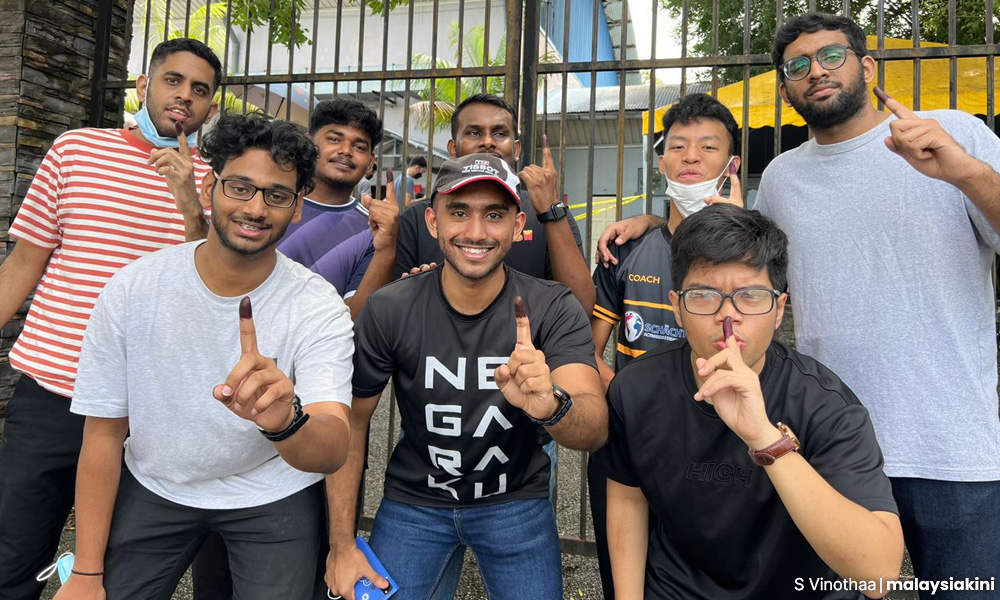
In Johor, there was a significant swing, an estimated 81 percent turnout in GE14, down to a serious low of an estimated 47 percent in Johor 2022, and up to a still low estimated 62 percent in GE15.
This reflects striking deficits/shifts in mobilisation and quiet dissatisfaction among the Indian community about their electoral choices and political engagement.
This variation is evident across many states in GE15, higher in Selangor and Perlis and lower in Kelantan and Johor.
Places, where the Indian community had a greater engagement, were in Penang, where turnout increased from GE14 to GE15 from an estimated 68 percent to an estimated 77 percent, and in KL/Putrajaya, up from an estimated 71 percent to an estimated 77 percent.
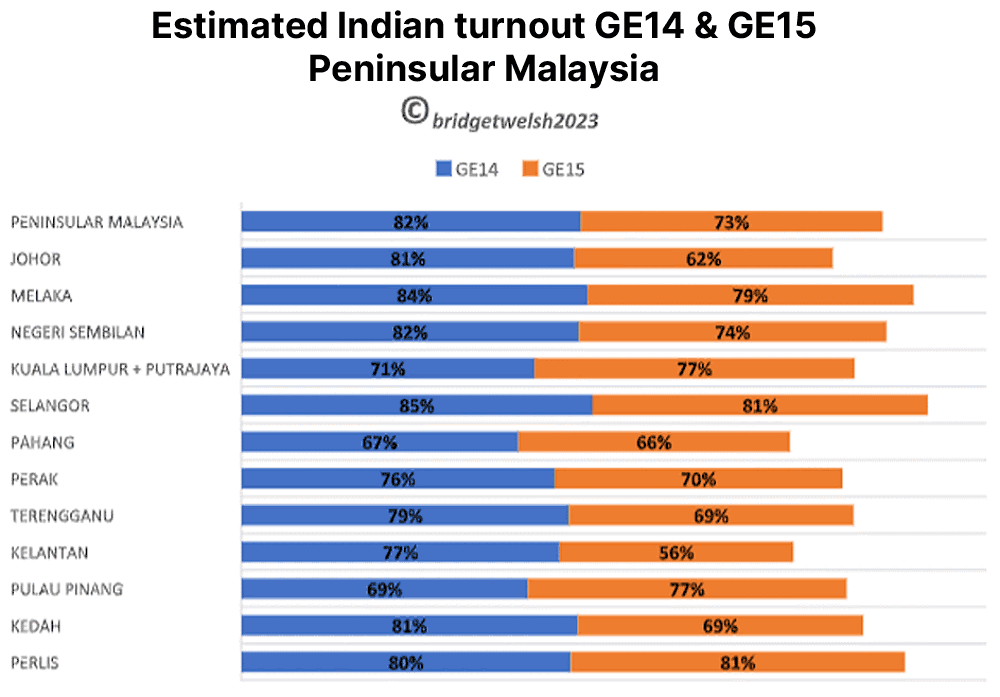
Regarding turnout, a takeaway is clear; when the Indian community is valued politically, recognised, mobilised, and listened to, they participate in larger numbers.
A striking illustration of what happens when they are seen to be ignored is in Padang Serai in Kedah (held after GE15), where turnout dropped after the formation of Prime Minister Anwar Ibrahim’s government with its sole Indian minister (who Anwar forgot to announce in his cabinet press conference).
Sizeable Indian swing
Estimated Indian support for Harapan remained the same at 81 percent in both GE14 and GE15.
There was a modest drop in support for BN from an estimated 18 percent to an estimated 16 percent.
This shift is a reflection of Umno/BN’s weakness and the gross mismanagement of the BN GE15 campaign by its chairperson Ahmad Zahid Hamidi. The distaste for his leadership of BN eroded electoral support across Malaysians.
The GE findings however obscure a significant change in Indian voting patterns. To appreciate the size of the dynamic Indian electoral swing, one needs to look at the state elections.
Indian support for Harapan effectively doubled in GE15 from the state polls, up from an estimated 41 percent in Johor 2022 and an estimated 46 percent in Malacca 2021.
Meanwhile, BN support among Indians collapsed in GE15. In Johor, it dropped to an estimated 21 percent and in Malacca to an estimated 19 percent.
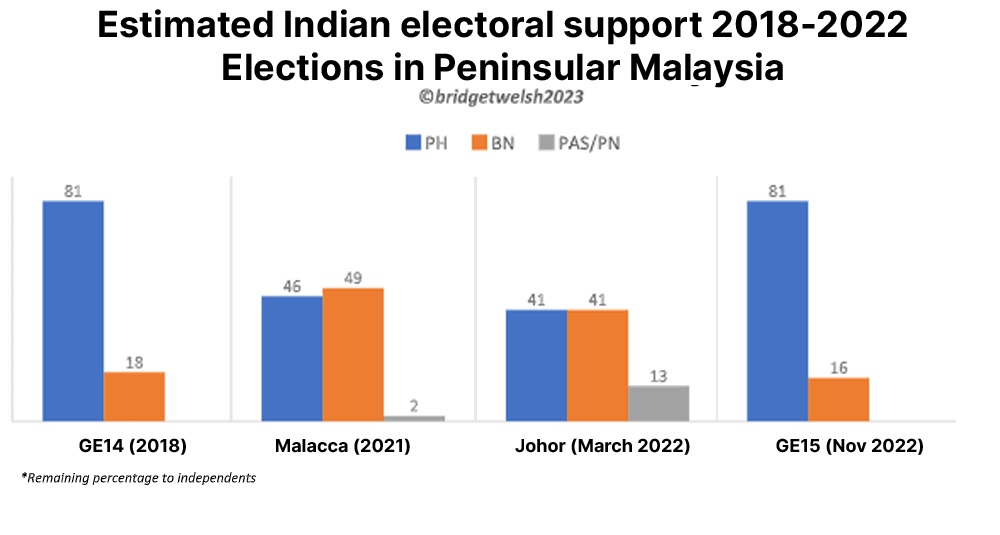
The other feature that cannot be ignored is Perikatan Nasional (PN)’s abysmal performance among Indians – nationally, zero, although they won small pockets of support in some states.
The estimated 13 percent gains made in the Johor polls evaporated after the racialised GE15 campaign. This is a reflection of the ethnic electoral polarisation taking place nationally. Indians were angered by PN’s extremist campaign rhetoric.
Variation across Peninsular Malaysia
A look at variation in estimated ethnic voting across states shows that Indian support in GE15 was highest for Harapan in Wilayah (Kuala Lumpur and Putrajaya), Penang, and Selangor, estimated at 92 percent, 87 percent, and 84 percent respectively.
Interestingly, however, PN’s support among Indians was also highest in Penang (estimated eight percent), followed by Kedah (estimated six percent where PN had its strongest performance in winning over new support).
Indian support for BN was highest in Pahang at an estimated 39 percent and lowest in Selangor at an estimated one percent.
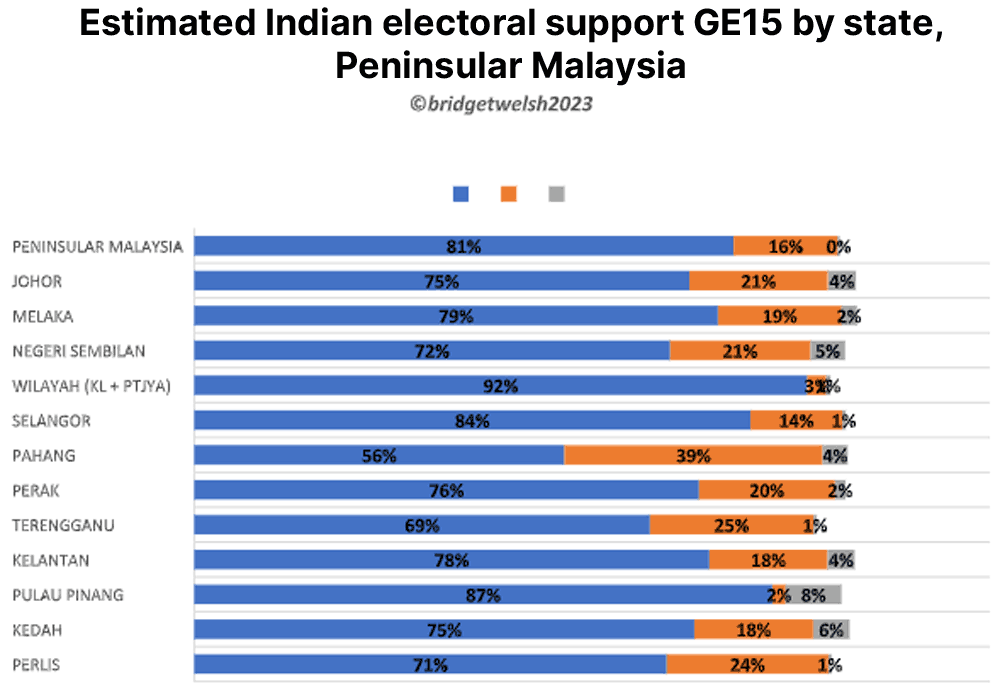
Regarding electoral support, the main takeaway is similar to before - when the Indian community is valued politically, recognised, listened to, and concerns addressed, they support you. In the state polls of Malacca and Johor, they received greater attention from BN and PN.
Indian electoral support changed in GE15. In the former Umno-governed states, there was no follow-up, and the hero for many in the community - former prime minister Najib Razak - who actually had a blueprint to address their concerns, was replaced by a national Umno leader without any real standing among Indians.
For PN and its exclusionary Malay ethno-nationalist campaign, a rejection by Indians was emphatically clear.
Where Indian support mattered in GE15
In GE15, Indians returned their support to Harapan, hopeful for change and a more responsive government to address the challenges facing the community.
The community comprises 6.6 percent of the population and 7.2 percent of the electorate, or 1.5 million voters. Their influence is especially impactful in the 22 seats where they comprise over 10 percent of the vote.
Of these seats, Harapan won 18. In all of these seats, Indian support was important, especially given the reality of competitive three-coalition contests.
Support from the Indian community varied, higher in Ipoh Barat and lower in Teluk Intan, where no Indian state assemblyperson was fielded by DAP compared to past practices.
There were two seats where the Indian vote was especially impactful. The first was Kuala Selangor, where Indian support was crucial for the victory of incumbent Dzulkefly Ahmad over the loser (now appointed minister) Tengku Zafrul Abdul Aziz.
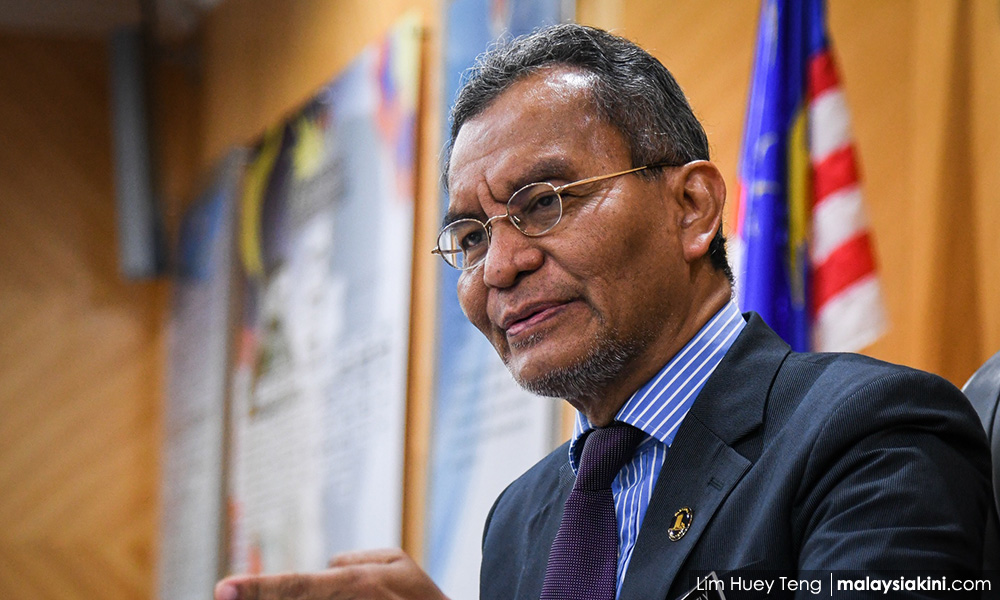
A second was in Bagan Datuk, where now Deputy Prime Minister Zahid scraped through. Here, Indian turnout dropped and support levels for Harapan were lower than the national level, highlighting a missed opportunity to win this seat.
Ironically, two leaders rejected by Indian voters in these constituencies were appointed by the new government.
Of the other three seats with significant Indian voters, two were won by the PN Malay wave – Kuala Langat and Padang Serai – and the other, Rembau, was won by the popularity of Umno deputy president Mohamad Hasan.
Search for better governance
The pattern of Indian electoral support in the past few elections show that they do change their support. Inadequate attention to the concerns of this community has shaped outcomes, and will likely do so again. Ignoring the Indian community risks electoral peril.
In Selangor, for example, repeated calls for a meaningful programme to address the vulnerabilities of Indians have yet to be implemented despite proposals being forwarded to the state government.
There is also frustration at the national level. With all communities in Malaysia, there is a need to appreciate the context and cultural conditions facing different groups in Malaysian society. There is a palpable sense among some Indians of already being left behind in Anwar’s government.
Issues impacting the vulnerabilities of the Indian community appear to be overlooked, from poverty to education.
For example, despite calls in Parliament for greater investigation of scandals and a Royal Commission of Inquiry surrounding the Malaysian Indian Community Transformation Unit (Mitra), nothing appears to be done yet.
Last month, a 35-year-old Indian man died in custody, continuing a pattern of deaths in custody that goes beyond individuals, reflecting persistent concerns about the systemic discrimination faced by the community as a whole.
So far, this crucial political base for Harapan is being taken for granted. The Indian community remains hopeful, as others are as well. The key will be how long they will wait. History shows that they can swing in elections, and swing big. - Mkini
BRIDGET WELSH is an honorary research associate of the University of Nottingham, Malaysia’s Asia Research Institute (Unari). She is also a senior research associate at the Hu Fu Centre for East Asia Democratic Studies and a senior associate fellow of The Habibie Centre. Her writings can be found at bridgetwelsh.com.
The views expressed here are those of the author/contributor and do not necessarily represent the views of MMKtT.




No comments:
Post a Comment
Note: Only a member of this blog may post a comment.